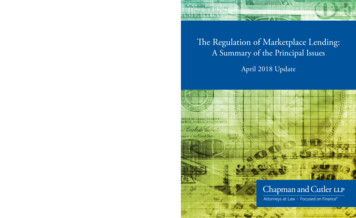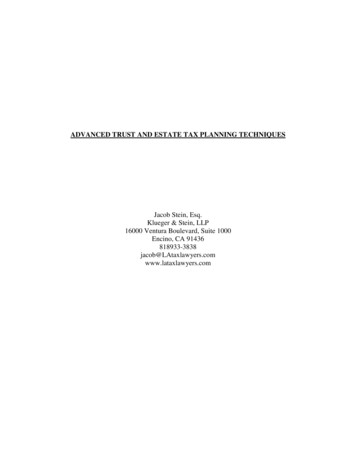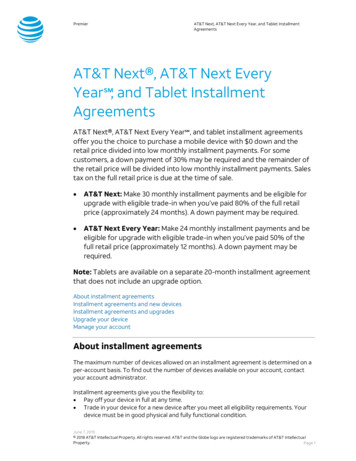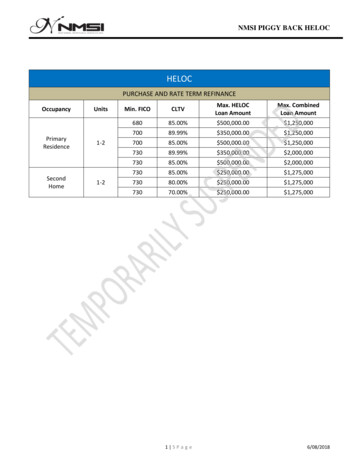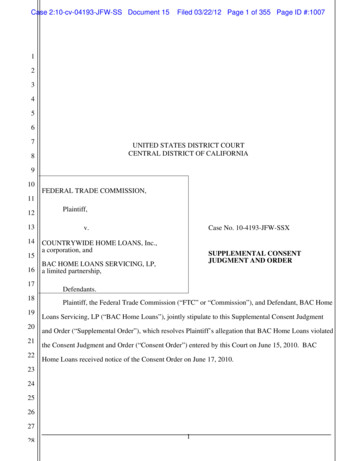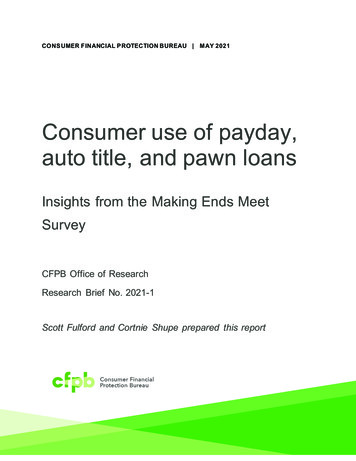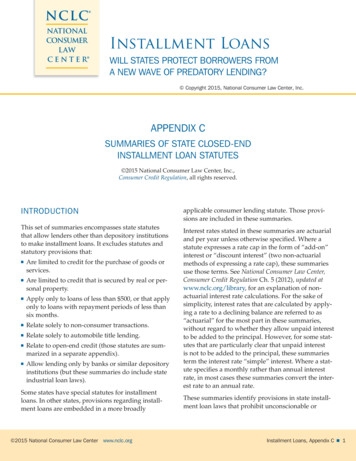
Transcription
NCLC NATIONALCONSUMERLAWCENTER Installment LoansWILL STATES PROTECT BORROWERS FROMA NEW WAVE OF PREDATORY LENDING? Copyright 2015, National Consumer Law Center, Inc.APPENDIX CSUMMARIES OF STATE CLOSED-ENDINSTALLMENT LOAN STATUTES 2015 National Consumer Law Center, Inc.,Consumer Credit Regulation, all rights reserved.INTRODUCTIONapplicable consumer lending statute. Those provisions are included in these summaries.This set of summaries encompasses state statutesthat allow lenders other than depository institutionsto make installment loans. It excludes statutes andstatutory provisions that: Are limited to credit for the purchase of goods orservices. Are limited to credit that is secured by real or personal property. Apply only to loans of less than 500, or that applyonly to loans with repayment periods of less thansix months. Relate solely to non-consumer transactions. Relate solely to automobile title lending. Relate to open-end credit (those statutes are summarized in a separate appendix). Allow lending only by banks or similar depositoryinstitutions (but these summaries do include stateindustrial loan laws).Some states have special statutes for installmentloans. In other states, provisions regarding installment loans are embedded in a more broadly 2015 National Consumer Law Centerwww.nclc.orgInterest rates stated in these summaries are actuarialand per year unless otherwise specified. Where astatute expresses a rate cap in the form of “add-on”interest or “discount interest” (two non-actuarialmethods of expressing a rate cap), these summariesuse those terms. See National Consumer Law Center,Consumer Credit Regulation Ch. 5 (2012), updated atwww.nclc.org/library, for an explanation of nonactuarial interest rate calculations. For the sake ofsimplicity, interest rates that are calculated by applying a rate to a declining balance are referred to as“actuarial” for the most part in these summaries,without regard to whether they allow unpaid interestto be added to the principal. However, for some statutes that are particularly clear that unpaid interestis not to be added to the principal, these summariesterm the interest rate “simple” interest. Where a statute specifies a monthly rather than annual interestrate, in most cases these summaries convert the interest rate to an annual rate.These summaries identify provisions in state installment loan laws that prohibit unconscionable orInstallment Loans, Appendix C 1
unreasonable charges. These summaries do not,however, list other state sources of unconscionability rules. For example, a number of state unfair anddeceptive practices statutes prohibit unconscionableconsumer transactions. Whether those laws apply tocredit terms varies from state to state and is beyondthe scope of these summaries. See National Consumer Law Center, Unfair and Deceptive Acts andPractices §§ 2.2.1, 4.4 (8th ed. 2012), updated at www.nclc.org/library for a discussion of these issues.Many states also recognize a common law prohibition of unconscionability.The summaries contained in this appendix list thetypes of insurance for which the statutes allow creditors to charge consumers. If the statute prohibitscreditors from charging consumers for insurance incertain transactions, such as loans under a certainamount, that is noted. However, the summaries donot list other restrictions, such as restrictions on therates or the reasonableness of the insurance.State installment loan statutes typically identify thefees other than interest that lenders can charge. Thesesummaries list those fees to the extent that they areconditions of the extension of credit. In other words,these summaries list fees, such as investigation fees,document preparation fees, origination fees, transaction fees, and “points,” that the borrower is boundto incur in order to get or use the extension of credit.The summaries do not include charges that relatesolely to loans secured by real estate, or charges suchas extension or deferment charges, collection costs,charges for dishonored checks, and charges for special processing of payments that are imposed only iffuture events occur. Most state installment loan statutes allow lenders to pass through to consumers feesfor recording and releasing security interests, including fees for noting a lien on a motor vehicle certificate of title. These fees are described collectively asrecording fees in these summaries, but details aboutthe amount of the fees are omitted.Some state consumer credit statutes provide that theconsumer has the right to prepay a loan, but do notexplicitly state whether a prepayment penalty can be2 Installment Loans, Appendix Ccharged. In some cases, the statute may explicitly orimplicitly forbid any charge that is not specificallyallowed. These statutes will likely be interpreted toallow prepayment without penalty, since the statutedoes not specifically allow a prepayment penalty.The statutes’ provisions for rebates of unearnedinterest upon repayment must be read with the federal rebate statute, 15 U.S.C. § 1615, in mind. Thefederal law requires the rebate of unearned interestupon prepayment. Moreover, it prohibits any rebatemethod less favorable than the actuarial method fora consumer credit transaction with a term exceeding sixty-one months, and overrides less protectivestate laws. The rebate provisions of many of the stateinstallment loan laws are consistent with these federal requirements, but inconsistent state provisionsare preempted by the federal law.Another federal restriction relevant to these summaries relates to wage assignments. The FTC’s CreditPractices Rule, 16 C.F.R. § 444.2(a)(3), prohibits wageassignments unless they are revocable or applyonly to wages already earned, with exceptions forpayroll deduction plans and for wages that werealready earned at the time of the assignment. Manystate installment loan laws have a similar prohibition,but the federal rule overrides any less protectivestate laws.Many state consumer credit statutes require certainlenders to be licensed. These summaries describeany consequences that attach to unlicensed lendingthat are specified in the statute. In some cases, theconsequences may be indirect. For example, somestatutes allow a lender to charge more than a certainrate only if licensed, and provide that a loan is voidif it includes unauthorized charges. Under thesestatutes, any charges above that rate in a loan by anunlicensed lender are unauthorized, so the lack of alicense means that the loan is void.These summaries simplify complex statutory provisions, and do not attempt to capture all the nuancesof the statutes or resolve ambiguities. They are basedprimarily on a close reading of the statutory language, and courts may have interpreted these laws in 2015 National Consumer Law Centerwww.nclc.org
unexpected ways. We asked regulators in each stateto review their state’s summaries, and many did, butthe conclusions and summaries are ours and do notrepresent an official interpretation or the views ofstate regulators. Consumers and lenders should consult an attorney or other authoritative source aboutthe application and interpretation of these laws, andattorneys should review their state statutes, regulations, and judicial decisions thoroughly before advising clients about their requirements. Correctionsshould be brought to the attention of the authors.These summaries were prepared in early 2015 and donot reflect amendments that may have occurred sincethen. These summaries are also included as Appendix D to National Consumer Law Center, ConsumerCredit Regulation (2012), updated at www.nclc.org/library, and will be updated there.applies only to loans of less than 1,000. §§ 5-18-4,5-18-18. Loan term must not exceed 25 months (12months if loan is made under alternate rate structure). § 5-18-15(i), (m)(2).Other restrictions on applicability of statute (e.g., it onlyapplies if lender takes a mortgage on real property): Statute is silent.What rate of interest is allowed? 36% on first 200, and 24% on remainder, and, ifthe scheduled monthly payment is at least 30, anaccount maintenance fee of 3 for each month ofthe scheduled period of repayment. §§ 5-18-15(a),(b), (m)(4), 8-8-14(a). A surcharge of 6% of theamount financed can be added to the principal. Alternative rate structure (allowed if loan term isno more than 12 months and payments are at least 40 per month): Acquisition charge not in excess of 10% of theamount of principal; andInstallment account handling charge in anamount no greater than the following: 12 per month on loan of at least 100 but nomore than 300; 14 per month on loan of more than 300 butno more than 400; 16 per month on loan of more than 400 butno more than 500; 17 per month on loan of more than 500 butno more than 800; 20 per month on loan of more than 800 butless than 1,000. For loan made under alternative rate structure, noinsurance charge or interest surcharge is permitted. § 5-18-15(m)(4). Any lender may lend at 2 percentage points abovethe prime rate. § 8-8-14(b).ALABAMAAla. Code §§ 5-18-1 to 5-18-23 (SmallLoan Act).What types of lenders does it apply to (e.g., banks vs. nonbanks)? Does not apply to: Banks, trust companies, savings or building andloan associations, and credit unions. Pawnbrokers. Various agricultural loans. The business of financing the purchase of motorvehicles, refrigerators, or other personal property. Loans insured or guaranteed by the United Statesor any of its agencies.§ 5-18-4(b).Licensure requirements and implications of licensure:License required to engage in business of makingloans of less than 1,000 and charge more than wouldbe permitted without a license. § 5-18-4(a).Size and length of loans to which the statute applies, andany restrictions in the statute on these features: Statute 2015 National Consumer Law Centerwww.nclc.orgWhat loan fees are allowed? Recording fees.§ 5-18-15(g).What types of insurance are allowed, and any limits thelending statute places on charges? May require propertyinsurance on collateral and offer credit life, disability,and unemployment insurance. §§ 5-18-17, 5-19-20.Installment Loans, Appendix C 3
For loan made under alternative rate structure (seeabove), no insurance charge is permitted. § 5-1815(m)(4).Other significant features: Prohibits loan-splitting.§§ 5-18-15(h), 5-18-18. Anti-evasion provision.§ 5-18-4(c).Does statute prohibit all other fees besides those specificallyallowed? Yes. § 5-18-15(h).Ala. Code §§ 5-19-1 to 5-19-33 (ConsumerCredit Act or “Mini-Code”).Does statute restrict balloon payments or irregular payment schedules? Every loan contract must require payment in installments at approximately equal periodicintervals (except to accommodate seasonal income).No installment contracted for shall be substantiallylarger than any preceding installment. §§ 5-18-15(i),5-18-16(c).Any restrictions on refinancing? Statute is silent.Any rebate requirements or restrictions on prepaymentpenalties? Rule of 78s refund (sum of the balancesmethod) for full prepayment; statute also specifiesrebate rules when borrower makes partial prepayment of three or more installments. § 5-18-15(d). Forprepayment in full of loan made under alternativerate structure (see above), the installment accounthandling charge is subject to refund, but not theacquisition charge. § 5-18-15(m)(3). Prepayment penalties are likely prohibited because not specificallypermitted. See § 5-18-15(h).What security interests (or postdated checks or ACHauthorizations) are allowed or prohibited? Statute prohibits licensee from taking a lien upon real estate, excepta judgment lien. § 5-18-4.Does statute prohibit unconscionable loan charges? Statute is silent.Must lender underwrite or evaluate borrower’s ability torepay? Statute is silent.If state has a criminal usury law, is lending under thisstatute exempt from it? Not applicable.Reporting requirements, including detail about what mustbe reported and whether there are any requirements thatthe state agency review or take other steps regarding thereports: Annual report in form prescribed by supervisor, who shall publish annual analysis and recapitulation. § 5-18-11(b).4 Installment Loans, Appendix CWhat types of lenders does it apply to (e.g., banks vs.non-banks)? Applies generally to all creditors, exceptpawnbrokers, insurance agents or agencies thatcharge collection fee on unpaid balances for insurance premiums, and policy loans by life insurancecompanies. In addition, provisions other than that§ 5-19-1(1) (definition of “finance charge”) and§ 5-19-3 (maximum finance charges), do not apply to: A transaction involving an interest in real propertywhere creditor is exempt from licensing. Non-consumer transactions. A credit transaction by a tax-exempt trust or by abank or trust company in its capacity as a fiduciaryunder any qualified employer stock bonus, pension, or profit-sharing plan. A municipal pension system created under Alabama law.§ 5-19-31.Licensure requirements and implications of licensure:With exceptions for banks, savings or building andloan associations, savings banks, other thrift institutions, bank holding companies, thrift holdingcompanies, credit unions, and federally constitutedagencies, a license is required to make consumerloans to Alabama residents or take assignments ofconsumer credit contracts. § 5-19-22(a). Any personlicensed under the Small Loan Act may engage inbusiness under that Act, but shall not make loans inexcess of 1,000 unless such person is also licensedunder this Act. § 5-19-22(f). If lender makes loanwithout a license, it may still bring suit on the loan,but only after acquiring licensure. § 5-19-19(b).Size and length of loans to which the statute applies, andany restrictions in the statute on these features: Statutehas certain provisions that apply to loans under 2015 National Consumer Law Centerwww.nclc.org
2,000 and loans over 2,000. For closed-end loans of 1,000 or less that are payable in installments, termshall be no more than 36 months and 15 days, andno more than 24 months and 15 days if the originalamount financed is 300 or less. § 5-19-18.Other restrictions on applicability of statute (e.g., it onlyapplies if lender takes a mortgage on real property): Statute is silent.What rate of interest is allowed? For loan of less than 2,000: Add-on rates of 15 per 100 per year for the first 750, plus 10 per 100per year for remainder. In addition, lender maycharge an interest surcharge of 6% of the first 2,000of the amount financed. § 8-8-14(a).For loan of 2,000 or more: Any rate, subject to “alllaws relating to unconscionability in consumertransactions.” § 5-19-3(e) (incorporating § 8-8-5).What loan fees are allowed? Account maintenance feeof 3.00 for each month, which shall not bear interest.§ 5-19-33(a).What types of insurance are allowed, and any limits thelending statute places on charges? Credit life, disability,and involuntary unemployment insurance; property insurance on collateral and liability insurance,but only if original amount financed is 300 or moreand the value of the property is 300 or more; nonfiling insurance; other insurance as allowed by rule.§ 5-19-20.Does statute prohibit all other fees besides those specificallyallowed? Statute provides penalties for charging afinance charge in excess of the amount authorized bythe statute, § 5-19-19(a), but otherwise is silent.Does statute restrict balloon payments or irregular payment schedules? Debtor has right to refinance anyballoon payment on terms at least as favorable asthe original terms, except where payments havebeen adjusted to conform to the debtor’s seasonal orirregular income, or loan is repayable in a single principal payment irrespective of the scheduled interest payments. § 5-19-7. For closed-end transactionswhere debt is payable in installments and in which 2015 National Consumer Law Centerwww.nclc.orgoriginal amount financed is 1,000 or less, debt shallbe scheduled to be payable in substantially equalinstallments at equal periodic intervals, except tothe extent that the schedule of payments is adjustedto the seasonal or irregular income of the debtor orwhen the transaction is a single principal paymentobligation irrespective of the scheduled interest payments. § 5-19-18.Any restrictions on refinancing? If loan is renewed orrefinanced within first 120 days, debtor is entitled topro rata refund of finance charge. § 5-19-4(h).Any rebate requirements or restrictions on prepaymentpenalties? Debtor may prepay without penalty.§§ 5-19-3(d)(3), 5-19-4(c). For loan with original termof more than 61 months, actuarial rebate; for all othertransactions, Rule of 78s (sum of the balances), but norefund of less than 1.00 need be made. § 5-19-4(c).When creditor has charged the 6% interest surchargepermitted by § 8-8-14, and borrower prepays withinfirst 90 days, borrower is entitled to pro rata rebateof the surcharge, except that creditor may retain 25.§ 8-8-14(a).What security interests (or postdated checks or ACHauthorizations) are allowed or prohibited? Statute issilent.Does statute prohibit unconscionable loan charges? Yes.§ 5-19-16. See also § 8-8-5(a) (allowing agreed ratetransactions but subjecting them to this unconscionability rule).Must lender underwrite or evaluate borrower’s ability torepay? Statute is silent.If state has a criminal usury law, is lending under thisstatute exempt from it? Not applicable.Reporting requirements, including detail about what mustbe reported and whether there are any requirements thatthe state agency review or take other steps regarding thereports: Statute is silent.Other significant features: Loan-splitting prohibited.§ 5-19-17.Installment Loans, Appendix C 5
What rate of interest is allowed? For loan up to 25,000:ALASKAAlaska Stat. §§ 06.20.010 to 06.20.920 (SmallLoans Act).What types of lenders does it apply to (e.g., banks vs. nonbanks)? All lenders except: Exception from license requirement only: Banks,savings banks, trust companies, building and loanassociations, and credit unions. § 06.20.010(b). Complete exemption: Individual loans by pawnbrokers where separate and individual loans do notexceed 750 or loan shops where separate and individual loans do not exceed 500. § 06.20.330.Licensure requirements and implications of licensure:A license is required for the business of makingloans up to 25,000 at an interest rate greater thanotherwise permitted by law for non-licensees.§§ 06.20.010(a), 06.20.300. Non-licensee is limited to rate that can be charged without a license,§ 06.20.300, and loan is unenforceable if more interest has been changed than permitted by the Act,§ 06.20.310.Size and length of loans to which the statute applies, andany restrictions in the statute on these features: Lawapplies to loans of 25,000 and less. Except for openend loans under § 06.20.285, licensee may not enterinto loan that provides for a scheduled repayment ofprincipal over more than the maximum terms set outbelow opposite the respective size of loans.PRINCIPAL AMOUNT OF LOANMAXIMUM TERMup to 1,00024 and 1/2 monthsOver 1,000 to 2,50048 and 1/2 monthsOver 2,500 to 5,00060 and 1/2 monthsOver 5,000 to 25,000as agreed to by the parties§ 06.20.250(c).Other restrictions on applicability of statute (e.g., it onlyapplies if lender takes a mortgage on real property): Statute is silent.6 Installment Loans, Appendix C 36% on first 850; 24% on amount over 850 but not exceeding 10,000; and Any rate agreed by contract on remainder.§ 06.20.230. For amounts greater than 25,000, alicensee may not charge more interest than allowedfor non-licensees. § 06.20.280.What loan fees are allowed? Recording fees, or nonfiling insurance premiums that do not exceed thesefees. For loans over 10,000, whether or not securedby an interest in real estate: reasonable costs and feespaid by a licensee for appraisals, surveys, title insurance or reports, and credit reports. § 06.20.260(a).What types of insurance are allowed, and any limits thelending statute places on charges? Credit insurance(defined as credit life insurance, credit disabilityinsurance, and credit unemployment insurance),insurance on pledged property, and non-filing insurance. § 06.020.260.Does statute prohibit all other fees besides those specificallyallowed? Yes. § 06.20.260.Does statute restrict balloon payments or irregular payment schedules? Yes, payments must be in substantially equal amounts and must be due at least oncea month, with the first payment beginning no laterthan 45 days from the date the loan is made. Thereare exceptions for seasonal or extraordinary income.§ 06.20.250(d), (e).Any restrictions on refinancing? Statute is silent.Any rebate requirements or restrictions on prepaymentpenalties? Statute is silent on rebate requirements.Prepayment penalties are likely prohibited becausenot authorized by § 06.20.260. Lender must permitpayment to be made in advance in any amount atany time. § 06.20.270(3).What security interests (or postdated checks or ACHauthorizations) are allowed or prohibited? Statute doesnot include restrictions on security interests. It refersto credit insurance on pledged property and to loans 2015 National Consumer Law Centerwww.nclc.org
secured by interests in real estate, so appears to contemplate these security interests. § 06.20.260(a)(2), (4).Does statute prohibit unconscionable loan charges? Statute is silent.Must lender underwrite or evaluate borrower’s ability torepay? Statute is silent.If state has a criminal usury law, is lending under thisstatute exempt from it? Not applicable.Reporting requirements, including detail about what mustbe reported and whether there are any requirements thatthe state agency review or take other steps regarding thereports: Annual report containing information as thedepartment may reasonably require. § 06.20.190.Other significant features: Loan-splitting prohibited.§ 06.20.240.Alaska Stat. § 45.45.080 (Installment Loans).What types of lenders does it apply to (e.g., banks vs.non-banks)? Applies to any “lender of money.”§ 45.45.080(a).Licensure requirements and implications of licensure: Statute is silent.Size and length of loans to which the statute applies, andany restrictions in the statute on these features: Loannot exceeding 10,000. Period of not over 7 years.§ 45.45.080(b).Other restrictions on applicability of statute (e.g., it onlyapplies if lender takes a mortgage on real property): Statute is silent.What rate of interest is allowed? Interest at 6 a yearfor each 100 (true annual interest rate for “addon method” of computation at a rate not to exceed11.1%; or “true annual interest rate for ‘discount method’What types of insurance are allowed, and any limits thelending statute places on charges? Lender may chargepremiums paid by lender for insurance required orobtained as security for or by reason of the installment loan. § 45.45.080(c)(2).Does statute prohibit all other fees besides those specificallyallowed? Yes. The only charges permitted are specifiedin § 45.45.080(c).Does statute restrict balloon payments or irregular payment schedules? Yes. Loan must be repayable in substantially equal installments. § 45.45.080(b).Any restrictions on refinancing? Statute is silent.Any rebate requirements or restrictions on prepaymentpenalties? Rule of 78s (sum of the balances method),but no refund of less than 5.00 need be made.§ 45.45.080(b).What security interests are allowed or prohibited (including postdated checks and ACH authorization)? No limitsindicated. Statute provides that lender may chargeinterest on loan “upon the security of personal property or otherwise.” § 45.45.080(a).Does statute prohibit unconscionable loan charges? Statute is silent.Must lender underwrite or evaluate borrower’s ability torepay? Statute is silent.Is lending under this statute exempt from state criminalusury law? Not applicable.Reporting requirements, including detail about what mustbe reported and whether there are any requirements thatthe state agency review or take other steps regarding thereports: Statute is silent.Other significant features: Not applicable.of computation at a rate not to exceed 11.8 percent) upon theoriginal face amount of the instrument evidencing the loanfor the entire period of the loan.” § 45.45.080(b).What loan fees are allowed? Recording fees.§ 45.45.080(c)(3), (4). 2015 National Consumer Law Centerwww.nclc.orgInstallment Loans, Appendix C 7
ARIZONAAriz. Rev. Stat. Ann. §§ 6-601 to 6-638(Consumer Lenders Act).What types of lenders does it apply to (e.g., banks vs. nonbanks)? Primarily non-bank lenders making at leastthree consumer loans per calendar year to state residents. Specific exclusions: Banks, savings banks, trust companies, savingsand loan associations, profit sharing and pensiontrusts, credit unions, insurance companies, andreceiverships. Licensed pawnbrokers. Lenders making fewer than two such loans per calendar year to state residents (see § 6-601(16)(b)). Mortgage brokers. Certain educational loans.§ 6-637(A).Other restrictions on applicability of statute (e.g., it onlyapplies if lender takes a mortgage on real property): Statute is silent.What rate of interest is allowed? 36% on first 3,000 and24% on remainder. § 6-632(A).What loan fees are allowed? Recording fees, or cost of non-filing insurance up tothat amount. § 6-635(A)(3). Loan origination fee of 5% of loan, capped at 150.§ 6-635(A)(4).What types of insurance are allowed, and any limits thelending statute places on charges? Property insuranceon collateral, life insurance, credit disability insurance, and credit unemployment insurance. §§ 6-636,6-638.§ 6-602Does statute prohibit all other fees besides those specificallyallowed? Yes. § 6-635(C).Licensure requirements and implications of licensure:License required to engage in consumer lender business (making loans of 10,000 or less) unless exempt.§ 6-603(A). Loan made by unlicensed lender is void.§ 6-613(B).Does statute restrict balloon payments or irregular payment schedules? Consumer loans: Yes, note must provide for approximately equal periodic installments.§ 6-637(B). See also § 6-634(A).Size and length of loans to which the statute applies, andany restrictions in the statute on these features: Maximum loan size subject to statute: 10,000 or less.§§ 6-601(7), 6-602(B). Maximum loan term for consumer loans: 24 months and 15 days for loans up to 1,000. 36 months and 15 days for loans greater than 1,000but no more than 2,500. 48 months and 15 days for loans greater than 2,500but no more than 4,000. 60 months and 15 days for loans greater than 4,000but no more than 6,000. Any agreed on time period for loans of more than 6,000.8 Installment Loans, Appendix CAny restrictions on refinancing? Prohibits charging ofa loan origination fee if loan is refinanced within oneyear. § 6-635(A)(4)(a).Any rebate requirements or restrictions on prepaymentpenalties? Lender must allow prepayment at any time.§ 6-637(F). Actuarial rebate. § 6-634(B).What security interests are allowed or prohibited (including postdated checks and ACH authorization)? Statuteis silent, but references in various sections appearto contemplate security interests in personal andreal property. See, e.g., §§ 6-635(A)(3) and § 6-636(E)(referring to property insurance and securityinterests).Does statute prohibit unconscionable loan charges? Statute is silent. 2015 National Consumer Law Centerwww.nclc.org
Must lender underwrite or evaluate borrower’s ability torepay? Statute is silent.What rate of interest is allowed? 17%. Ark. Const.amend. 89, § 3; Ark. Code Ann. § 4-57-104.Is lending under this statute exempt from state criminalusury law? Criminal usury statute, § 13-2208, onlycriminalizes charging interest greater than authorizedby other law.What loan fees are allowed? Statute and constitution aresilent.Reporting requirements, including detail about whatmust be reported and whether there are any requirementsthat the state agency review or take other steps regarding the reports: Annual report in form prescribed bysuperintendent, including lender’s standard APRsfor several types of loans, including a 500 unsecuredconsumer loan payable in 12 equal monthly installments, a 2,500 consumer loan secured by a motorvehicle payable in 36 equal monthly installments,and a 9,000 consumer loan secured in full by realproperty payable in 120 equal monthly installments,Superintendent must compile quarterly report of thestandard APRs. §§ 6-609, 6-635(D).Other significant features: Anti-evasion provision.§ 6-603(B). Referral fees prohibited. § 6-611(B).ARKANSASArk. Const. amend. 89; Ark. Code Ann.§§ 4-57-101 to 4-57-108 (Consumer Loansand Credit Sales).What types of lenders does it apply to (e.g., banks vs. nonbanks)? All loans other than bonds issued and loansmade by governmental units, and loans by federallyinsured depository institutions. Ark. Const. amend.89, §§ 1, 2.Licensure requirements and implications of licensure: Statute and constitution are silent.Size and length of loans to which the statute applies, andany restrictions in the statute on these features: Statuteand constitution are silent.Other restrictions on applicability of statute (e.g., it onlyapplies if lender takes a mortgage on real property): Statute and constitution are silent. 2015 National Consumer Law Centerwww.nclc.orgWhat types of insurance are allowed, and any limits thelending statute places on charges? Statute and constitution are silent.Does statute prohibit all other fees besides those specificallyallowed? Yes. Ark. Code Ann. § 4-57-105.Does statute restrict balloon payments or irregular payment schedules? Statute and constitution are silent.Any restrictions on refinancing? Statute and constitution are silent.Any rebate requirements or restrictions on prepaymentpenalties? Statute and constitution are silent.What secu
Acquisition charge not in excess of 10% of the amount of principal; and Installment account handling charge in an amount no greater than the following: 12 per month on loan of at least 100 but no more than 300; 14 per month on loan of more than 300 but no more than 400; 16 per month on loan of more than 400 but


